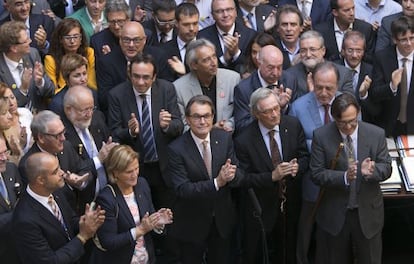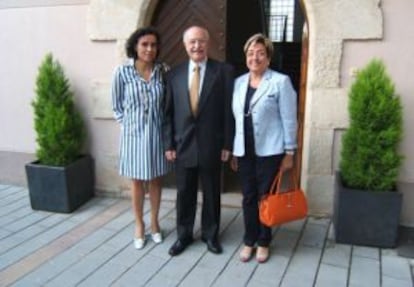Catalan government pressures mayors by email to help with November vote
Only five villages are refusing to lend out local premises for the substitute referendum

The Catalan government is ramping up its efforts to ensure that mayors across the region will let it use municipal premises to hold a vote on self-rule on November 9.
The nearly 700 mayors of Catalonia’s least-populated municipalities have been receiving emails and phone calls from a number of Catalan officials since Friday of last week, requesting the use of local spaces and staff to man the polling stations.
An official – albeit non-binding – referendum for November 9 had been passed by the Catalan government and signed into effect by regional premier Artur Mas. However, an appeal by the central government against the legislation with the Constitutional Court has seen the vote suspended. The court accepted the appeal on September 29 and immediately suspended all campaigning activities until it rules on the issue.
In response, Mas, of the CiU bloc, announced a parallel, non-binding vote to be held on the same day, albeit one that is not backed by any legislation and therefore lacking official character. But critics in the northeastern region are calling this substitute vote a sham and an attempt to appease the secessionist camp after allegedly yielding to Madrid.
The Catalan government is trying to avoid any written records of its efforts to set up its alternative “deliberative process” in order to make it “very difficult” for Prime Minister Mariano Rajoy to appeal this as well, said a Catalan official.
Because emails and telephone calls do not count as administrative actions, they cannot be appealed by the central government on the grounds that the Constitutional Court’s suspension is being violated, said the same source.
CiU’s extensive territorial power has ensured that most local leaders agree to cooperate despite warnings issued by the central government’s delegation in Barcelona.
Catalonia has 947 municipalities but only 251 have regionally run public centers. That leaves 696 villages of fewer than 5,000 residents where cooperation from the mayors is essential in order to set up the polling stations.
Pressure since last Friday has been strong, and a week later only five municipalities were still defying Barcelona with a refusal to help organize the vote.

First, local leaders were sent a form that they had to fill out indicating what equipment they would be loaning out for the day, as well as the name, ID and contact information of the designated individual in charge of overseeing the vote. The email demanded that this person first register as a volunteer in the “deliberative process.”
Mayors also received personalized letters, whose tone varied from friendly to authoritarian.
The five rebel villages are Pontons (Barcelona), Horta de Sant Joan (Tarragona), and Arres, Canejan and Bausen, all located in the Valley of Aran.
Pontons Mayor Lluís Fernando Caldentey, of the conservative Popular Party, told EL PAÍS that he will not bow to the pressure and that in recent days he has received three calls from as many people demanding that he loan them municipal premises.
“This Thursday they were still insisting, but I won’t change my mind,” he said. “My municipality will not participate in this farce on November 9.”
The leader of this village of 500 people says he does not oppose a vote if it is truly negotiated among all parties, and notes that a few months ago he lent a local space to Asamblea Nacional Catalana, the most vocal pro-independence civil association in Catalonia.
“I can’t make a fool of myself like that,” says Caldentey about the November 9 vote. “If it costs me the mayor’s seat, so be it. But I am acting on what my conscience tells me.”
Tu suscripción se está usando en otro dispositivo
¿Quieres añadir otro usuario a tu suscripción?
Si continúas leyendo en este dispositivo, no se podrá leer en el otro.
FlechaTu suscripción se está usando en otro dispositivo y solo puedes acceder a EL PAÍS desde un dispositivo a la vez.
Si quieres compartir tu cuenta, cambia tu suscripción a la modalidad Premium, así podrás añadir otro usuario. Cada uno accederá con su propia cuenta de email, lo que os permitirá personalizar vuestra experiencia en EL PAÍS.
¿Tienes una suscripción de empresa? Accede aquí para contratar más cuentas.
En el caso de no saber quién está usando tu cuenta, te recomendamos cambiar tu contraseña aquí.
Si decides continuar compartiendo tu cuenta, este mensaje se mostrará en tu dispositivo y en el de la otra persona que está usando tu cuenta de forma indefinida, afectando a tu experiencia de lectura. Puedes consultar aquí los términos y condiciones de la suscripción digital.








































